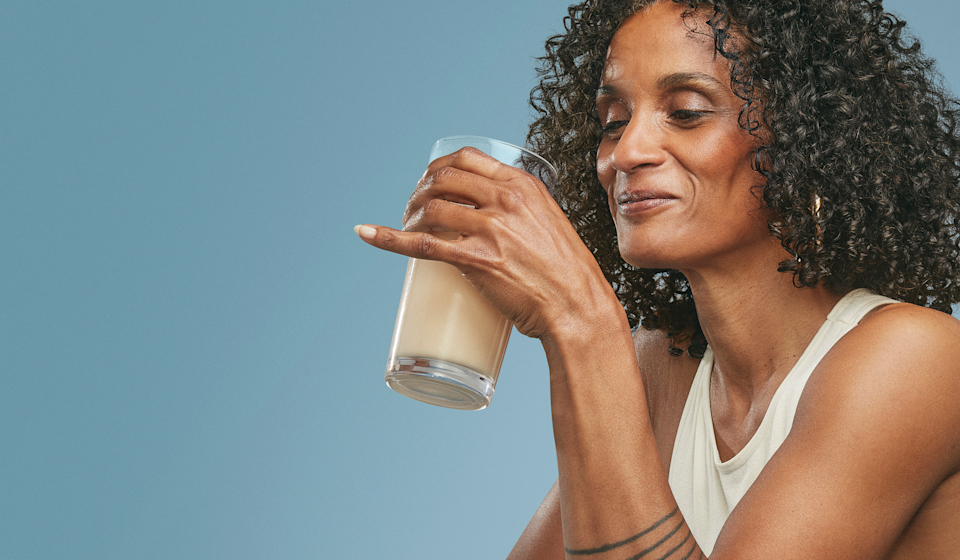8 Nutrients to Focus On After 50
Putting daily nutrition first is the driving force behind how we formulate our multivitamin. In other words, we believe in putting diet first, and then using our multivitamin to help fill nutrient gaps. That’s important for women of all ages. “We always wanted to give women over 50 the same attention as we gave women 18-50 years," says Dr. Luke. "Needs change with age, which means that we required a different formula.” It’s important to choose a multivitamin tailored to this specific lifestage to help support healthy aging from within.*
These are the 8 nutrients we think should be a non-negotiable in a multivitamin for women over 50:
1. Omega-3
Omega-3 fatty acids play an important role in health and are often under-consumed. One of those key omega-3s is DHA, which is the predominant fatty acid found in our brains. But DHA is also a bit of a multitasker—beyond supporting brain health, it also supports heart health and normal vision. DHA is most commonly found in fish, but the thing is, fish actually accumulate those omega-3s from microalgae. That means the original source of omega-3 is vegan-friendly—which is why we cut out the middleman (er, fish) and source the DHA in our multivitamins from microalgae.*
2. Vitamin K2
You may or may not know that estrogen is actually a key player in bone health: Basically, it helps our bones absorb all the calcium we get through our diets. While it’s still important to make sure you’re consuming calcium through your diet, supplementing with more calcium on top of that isn’t necessarily the answer. That’s where calcium helper nutrients come in, and K2 is one of them: It works with a protein called osteocalcin to help support bone health and remineralization.*
3. Magnesium
Say hello to another calcium helper nutrient. More than 50% of women over 50 are not getting the recommended amount of magnesium, which is a shame because it’s such a key player in bone maintenance and development. Beyond that, magnesium helps out with cell division and plays a role in Vitamin D metabolism.*
4. Boron
This unsung hero is yet another buddy to calcium, working to support bone health.*
5. Vitamin D3
Listen up—over 97% of women over 50 aren’t getting enough vitamin D through diet alone. (It’s tricky, since food sources of vitamin D like oily fish, eggs, and milk aren’t necessarily reliable, especially if you follow a plant-based or mostly vegetarian diet.) And since we hope you’re wearing lots of SPF when you spend time outside, the sun isn’t always the best resource of Vitamin D either. But we can’t overstate the importance of vitamin D—it’s another key player in calcium absorption, and also supports normal immune function and normal muscle function. That’s why we include 50 mcg per serving of D3 in our upcoming Essential for Women 50+.*
6. Vitamin E
As an antioxidant, vitamin E supports the fight against free radicals. That means E is the kind of vitamin you want on your team—which is why it’s not ideal that over 86% of women over 50 are low in this nutrient. Our advice: Choose a multivitamin with vitamin E sourced from mixed tocopherols.*
7. Vitamin B12
Since B12 is primarily found in meat, dairy products, and eggs, vegans and vegetarians can have a hard time getting the levels they need—which isn’t great, given that B12 is essential to a bunch of different functions in the body. To name a few, B12 supports brain health, energy-yielding metabolism, red blood cell formation, and normal cell division. That’s why we think that supplementing with B12 is a good idea.*
8. Folate
Yes, folate, and not folic acid. While they’re two different versions of the same B-vitamin, folic acid is a synthetic form that might be trickier for some of us to absorb. (Fact: around one-third of women of a genetic variation that make it tricky to efficiently utilize folic acid.) And since folate also contributes to red blood cell formation , normal cell division, and helps make neurotransmitters in our brain, it’s good to find a form that most of us can use. That’s why we use a version called 5MTHF in our multivitamins—a more bioavailable form of folate.*
Protein After 50 is Very Important, Too
While focusing on evolving micronutrient needs is a good idea after 50, it’s also important to mind your macros, too—including making sure you're getting enough protein. One reason consuming protein is so important? Muscle breakdown naturally increases as we get older, due to something called anabolic resistance, which essentially means that it’s harder to stimulate muscle protein synthesis and our bodies become less efficient at using protein. Supplementing with a high-quality protein powder can be a smart way to help support any dietary gaps as you age and aim for 1.2-1.6 grams of protein per kilogram of body weight each day. (3)
Why Are Calcium and Iron Missing From the List?
Let’s start with iron, which is important before menopause to help support the blood loss we experience through menstruation. But when we no longer have a period, our iron needs are considerably less—and most women can meet those needs through diet alone.*
As for calcium, we mentioned that while paying extra attention to bone health after menopause is important, supplementing with more calcium isn’t necessarily the answer—in fact, there’s a debate in the scientific community around the potential risks of overdoing it on calcium. That’s why we emphasize making sure you’re eating a diet rich in calcium, and providing additional support with nutrients that help out with calcium, like K2, magnesium, D3, and boron. We include all four of those nutrients in our Essential for Women 50+, so that calcium has extra help.*
This stage of life is a major transition, and you probably have lots of questions. We get it! But that’s also why we created our Essential for Women 50+—to help take some of that guesswork out of the equation.











